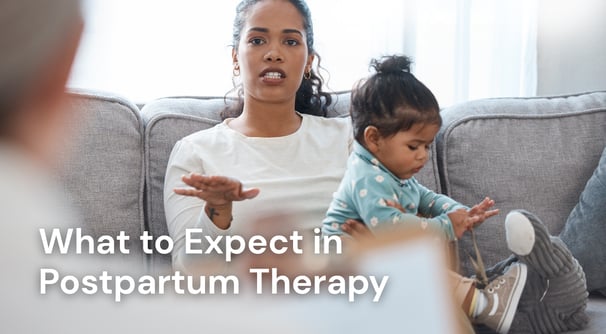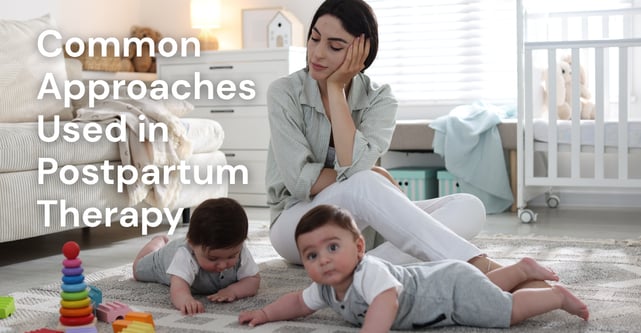What to Expect in Postpartum Therapy
7/2/20254 min read
Postpartum therapy often begins with a whisper of curiosity or desperation. Maybe you’ve been crying every day, feeling disconnected from your baby, or wondering when you’ll feel like “yourself” again. Maybe someone close suggested therapy, and you hesitated. Maybe you Googled it at 2 a.m., then closed the tab.
Whatever brought you here, know this: postpartum therapy is not about fixing you - it’s about supporting you through one of the most emotionally complex and physically exhausting periods of your life.
At Peace Temple, we’ve worked with hundreds of new mothers, each bringing their own mix of fear, shame, love, grief, and exhaustion into therapy. Many ask the same question at the beginning: What exactly happens in postpartum therapy?
This article will guide you through the process - gently, honestly, and without jargon.


Why Postpartum Therapy Matters
The postpartum period isn’t just about recovery—it’s a psychological transformation. Whether or not you're experiencing a clinical diagnosis like postpartum depression (PPD) or anxiety, therapy can help you:
Process birth trauma or disappointment
Navigate identity shifts and role confusion
Cope with intrusive thoughts or rage
Manage relationship strain or loneliness
Rebuild trust in your body and your emotions
And if you are experiencing PPD, postpartum anxiety, OCD, or trauma, therapy is a cornerstone of recovery.
You don’t need to wait until you’re “barely hanging on.” If something feels off, therapy is a safe and proactive place to start.
What Happens in a Postpartum Therapy Session?
The first session is often called an intake or assessment, but don’t let that term intimidate you. It’s not a test. It’s a conversation.
Your therapist may ask:
How have you been feeling since the birth?
What’s been hardest for you emotionally or physically?
How are you sleeping, eating, and connecting with your baby?
Do you have support at home?
Have you experienced anxiety, depression, or trauma before?
The goal is not to label you it’s to understand what you’re carrying so your therapist can walk alongside you in a way that actually helps.
At Peace Temple, our clinicians are trained specifically in perinatal mental health. We know how to hold space for raw emotion, quiet grief, and the chaos of early motherhood.
The Emotional Landscape: You Set the Pace
You may cry. You may sit in silence. You may laugh nervously or say things like:
“I feel numb but I don’t know why.”
“I love my baby but sometimes I want to run away.”
“I miss who I used to be.”
All of this is welcome.
Therapy is one of the few places where you don’t have to pretend. You don’t have to smile. You don’t have to filter your fears. Your therapist isn’t shocked or judging - they’re there to listen, reflect, and support you back into emotional safety.


Common Approaches Used in Postpartum Therapy
Depending on your symptoms, goals, and history, your therapist may draw from several evidence-based approaches:
1. Cognitive Behavioral Therapy (CBT)
CBT helps you challenge unhelpful thoughts like:
“I’m a bad mother.”
“I shouldn’t be feeling this way.”
“Everyone else is handling this better than me.”
You’ll learn how thoughts, feelings, and behaviors are connected—and how to gently reframe them for healing.
2. Interpersonal Therapy (IPT)
IPT focuses on relationship changes and role transitions. It’s especially helpful if you’re struggling with:
Marital tension
Loss of social connection
Grief over the loss of your “old self”
3. Trauma-Informed Therapy
For mothers who’ve experienced a traumatic birth, loss, or medical scare, therapy includes:
Nervous system regulation tools
Somatic (body-based) techniques
Gentle reprocessing of painful events
Peace Temple’s therapists are trained to recognize trauma responses and help you restore a sense of safety—in your body, mind, and environment.
4. Mindfulness and Compassion-Based Techniques
You may learn grounding exercises, breathwork, or visualization to reduce overwhelm and cultivate self-kindness—especially important for mothers battling perfectionism or guilt.
What Therapy Is Not
Let’s clear up some common misconceptions:
It’s not a judgment zone. You won’t be labelled a bad parent for sharing dark thoughts.
It’s not instant advice. Your therapist won’t tell you how to sleep train or parent—but they’ll help you explore what works best for your unique situation.
It’s not only for “severe” cases. You don’t need a diagnosis to benefit from therapy.
And no, your baby won’t be taken away just because you admit to struggling. In fact, seeking therapy often proves how deeply committed you are to your baby’s wellbeing and your own.
Can I Bring My Baby to Therapy?
Often, yes especially in the early months. Many perinatal therapists welcome nursing, rocking, or soothing during sessions. That said, if you’re able to have baby-free time, you may find it easier to focus on your own healing.
At Peace Temple, we offer flexibility: in-person, virtual, baby-in-arms, or quiet-from-home. You deserve care that works for your life—not the other way around.
How Long Does Therapy Last?
There’s no one-size-fits-all timeline. Some mothers feel better after 6–8 sessions. Others stay in therapy for months to explore deeper emotional patterns or continue support as their baby grows.
You and your therapist will regularly check in on your progress, adjusting goals as needed.
Remember, therapy isn’t forever but the tools you gain often are.
When Should You Start Therapy?
The best time? When you notice things feel “off.”
Some signs include:
Crying often or feeling emotionally flat
Persistent worry or intrusive thoughts
Difficulty bonding with your baby
Irritability, anger, or shame
Trouble sleeping even when baby is asleep
Feeling like you’re “going through the motions”
And if you’ve already reached a crisis point—it’s still not too late. Help can begin the moment you reach out.
Final Thoughts: You Don’t Have to Do This Alone
Postpartum therapy is not about having all the answers. It’s about having someone to sit with you in the questions.
It’s where the mask can come off. Where the pain can be spoken. Where the healing begins.
At Peace Temple, we believe every mother deserves a space that honors her full emotional reality not just the parts that fit the narrative of joy.
You were never meant to heal alone. And in therapy, you don’t have to.
